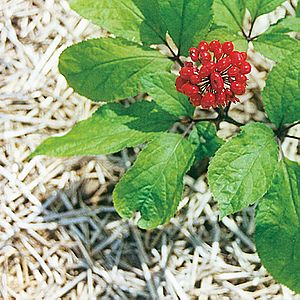Asian ginseng facts for kids
Quick facts for kids Asian ginseng |
|
|---|---|
 |
|
| Scientific classification |
|
| Kingdom: | Plantae |
| Clade: | Tracheophytes |
| Clade: | Angiosperms |
| Clade: | Eudicots |
| Clade: | Asterids |
| Order: | Apiales |
| Family: | Araliaceae |
| Genus: | Panax |
| Species: |
P. ginseng
|
| Binomial name | |
| Panax ginseng C.A.Mey.
|
|
| Script error: The function "autoWithCaption" does not exist. | |
| Synonyms | |
Script error: No such module "Check for conflicting parameters".
Panax ginseng, often just called ginseng, is a special plant. You might also hear it called Asian ginseng, Chinese ginseng, or Korean ginseng. Its root is the original source of the well-known herb, ginseng. This plant is a perennial, meaning it lives for many years. It grows naturally in the mountains of East Asia. It is one of the plants that can live for a very long time.
Contents
What is Panax Ginseng?
Panax ginseng has different names depending on the country. In Chinese, it is called Rénshēn (人蔘). In Korean, it is known as Insam (인삼). The Japanese name for it is Cyousen Ninjin (朝鮮人参).
Where Does Ginseng Grow?
Panax ginseng is originally from the mountains. You can find it in the Russian Far East, Northeast China, and the Korean Peninsula. Because it is so special, it is a protected plant in Russia and China. This means people cannot just pick it from the wild.
Most of the ginseng sold today comes from farms. It is grown carefully in China, Korea, and Russia. Some areas in Japan also grow this plant. Ginseng grows slowly. Farmers usually wait until the plants are five or six years old before harvesting their roots.
How is Ginseng Grown?
Panax ginseng is one of the most common types of ginseng grown by people. Other types include P. notoginseng, which grows naturally in China. Another popular type is P. quinquefolius. These plants are all part of the ginseng family.
What Do Scientists Say About Ginseng?
Scientists are studying ginseng to learn more about it. They are looking at natural chemicals in ginseng called ginsenosides. Researchers are studying if these chemicals might help with tiredness in people who have certain health conditions. They are also looking into whether ginseng could help with memory and thinking in healthy adults.
Right now, there isn't strong scientific proof that ginseng has big health effects. It is generally thought to be safe for adults to use for less than six months. However, using it for longer than six months might not be safe.
Ginseng in Traditional Medicine
Ginseng has been used for a very long time in folk medicine. People in many cultures have used it as an herb for different purposes. This is part of their traditional health practices.
See also
 In Spanish: Panax ginseng para niños
In Spanish: Panax ginseng para niños
 | Sharif Bey |
 | Hale Woodruff |
 | Richmond Barthé |
 | Purvis Young |

